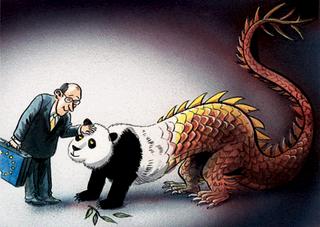Rapelang Mosae
There is a growing debate making the rounds in Africa and the rest of the world, the debate has been coined the “dragon slayers” versus the “panda huggers”. The debate is nothing more than just a debate on whether China represents an opportunity or a threat for the African continent. I found it poignant to weigh in on this debate, shining the light on a country that often finds itself slipping through the cracks in the general discourse on all issues African and indeed the whole globe and that country is none other than the proud Kingdom of Lesotho.
This year Lesotho and China celebrated thirty (30) years of bilateral relations through among others the handing over of the Maseru District Hospital and eye clinic. This hospital is of course just one of the many “gifts” China has given to Lesotho in the period of their bilateral relations.
Students of governance and international relations will however be quick to caution that these gifts are as a matter of fact not gifts but rather loans that will be paid by generations of Basotho for years to come. Furthermore, the more cynical among us will also state that there is no such thing as a free lunch. Whether the gifts are in fact gifts or not, one thing is certain, they have amplified China’s influence in Lesotho. It is also clear that China has vowed to use this influence to secure numerous economic opportunities for its nationals in Lesotho.
I will offer an example to shed light on the assertion of securing economic opportunities for Chinese nationals. In 2001 following the inception of the African Growth and Opportunity Act (AGOA) in Lesotho, the Chinese descended on Lesotho to open factories which in turn would supply the United States. It needs to be borne in mind that under AGOA, Lesotho received a blank cheque from the United States, wherein Lesotho was guaranteed duty-free and quota-free access to the United States market.
Instead of taking advantage of this, and opening its own factories, Lesotho instead opened the doors for the Chinese to open factories and take advantage of economic benefits that were instead meant for Basotho. Today twenty-three (23) years since the inception of AGOA, the benefit that Basotho can speak of is that the factories are the second biggest employer in the country and that factory workers receive a pittance.
In essence, Lesotho has become a repository of cheap labour for the Chinese whose claim to the United States market is simply that their produce bears the name and flag of Lesotho. When one looks at this arrangement in the factories, one cannot help but liken it to the days of colonialism. In those days the colonial masters used strong young African men to mine the wealth from their lands and then ship the same wealth to their countries of origin to develop them while leaving the colonized countries with just enough to see the next day.
In the past few months, Basotho have begun to wisen up to the devastating effects that Chinese involvement in Lesotho has had on both small and big businesses. There has been an uproar by micro, small, and medium enterprises, calling for the operationalisation of the laws that earmark certain businesses for indigenous Basotho. Any Mosotho knows that no matter where one is in the country, one is bound to find a Chinese operating a village shop.
If the law was to be operationalised, it stands to reason that some of the people who will feel its brunt are our brothers and sisters who hail from China. Construction companies have also come out to call on the government and the powers that be, to intervene in their plight against Chinese-owned companies who fail to honour their financial obligations to Basotho-owned companies.
The complaints by Basotho have been laid bare, what remains to be seen however is what the government plans to do about them. Will the government once again hold down the economy, gag and blindfold it and hand it over to the Chinese for further plunder?
The behaviour of the Chinese corporations in this country is not at all isolated cases of individual businesses but a systematic strategy by the Chinese government to enrich themselves out of Africa’s resources. That the Chinese government is complicit in the manner in which their citizens act in Lesotho was made clear by their response when local contractors appealed to the embassy to intervene and were instead given the run about. One does not need to be an international relations expert to know that any other diplomatic mission would have at the very least responded to the appeal. It takes a country that is very sure that they have put in place tactics that make them above reproach to sit and watch idly as their citizens constantly provoke the ire of their host country.
As indicated in the opening paragraph, the jury is still out on whether China represents an opportunity or a threat in Africa. However, in Lesotho when one looks at the many economic benefits that could be enjoyed by Basotho, which are constantly being handed over to the Chinese on a silver platter, one cannot help but see China as a threat.
Factories on Lesotho soil are firmly in the hands of the Chinese, scores of Basotho who used to operate shops in villages have closed shop while Chinese traders took over and lately Basotho contractors are overlooked for big projects in favor of Chinese Construction companies, leading to the failure of the said Basotho owned companies.
No matter how one decides to slice or dice it, the situation comes out screaming “Neo-colonialism”!
Summary
- I found it poignant to weigh in on this debate, shining the light on a country that often finds itself slipping through the cracks in the general discourse on all issues African and indeed the whole globe and that country is none other than the proud Kingdom of Lesotho.
- In 2001 following the inception of the African Growth and Opportunity Act (AGOA) in Lesotho, the Chinese descended on Lesotho to open factories which in turn would supply the United States.
- Today twenty-three (23) years since the inception of AGOA, the benefit that Basotho can speak of is that the factories are the second biggest employer in the country and that factory workers receive a pittance.

Your Trusted Source for News and Insights in Lesotho!
At Newsday Media, we are passionate about delivering accurate, timely, and engaging news and multimedia content to our diverse audience. Founded with the vision of revolutionizing the media landscape in Lesotho, we have grown into a leading hybrid media company that blends traditional journalism with innovative digital platforms.







